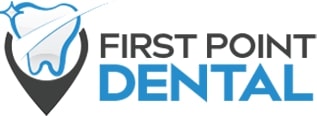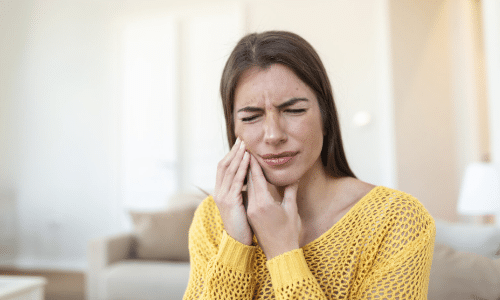My Tooth Hurts When I Bite Down: What Should I Do?
Experiencing tooth pain, whether it’s a dull ache or a sharp, throbbing sensation, when you bite or chew on any type of food is not normal. There are specific reasons why you might feel tooth pain while eating. Generally, it’s a sign of a serious dental issue.
To find relief from tooth pain, you should determine the cause behind it. The fear of sitting in a dentist’s chair might tempt you to try addressing your tooth pain on your own. However, it’s always advisable to visit a licensed dental professional in Chicago who has experience in identifying the root cause of dental problems, providing the best treatment, and preventing future oral health issues.
Why A Tooth Hurts When Someone Bites Down?
As per dentists in Chicago at First Point Dental Clinic, the pain someone feels while biting down or chewing on something stems from any one of the following dental problems:
- A crack in a tooth- This often results when someone bites on something very tough to break or when someone has a very large tooth filling. Such situations can cause hairline fractures in a tooth which over time may turn into tooth cracks which pains a lot.
- A decayed tooth- Severe infection or decay significantly weakens a tooth. In that case, it is more likely to easily break and eventually cause pain. Signs of dental cavities/carries/ decay include sensitivity to touch, spontaneous pain, and mild to severe pain while eating or drinking.
- Loose tooth filling- When a filling inside a tooth becomes loose, it loses its protection, which can lead to pain due to the exposure of tooth nerves.
- Tooth sensitivity- Exposure of the underlying layers of the tooth can make it sensitive to extreme temperatures and sugar-loaded or acidic foods and drinks. There are tiny channels within the tooth’s root that end at the nerve center so pain stimuli can reach there to make someone feel pain and sensitivity. Tooth sensitivity happens due to several different factors, including receding gum tissue, worn-down enamel or fillings, cavities, or TMJ (temporomandibular joint) disorder. A sensitive tooth may cause pain when biting or chewing.
- A tooth abscess- It is a pocket of pus that forms in a tooth infected with untreated bacteria. It can occur in different parts of the tooth.
- Periodontal disease- Infections of the gums result in swollen, bleeding, and red gums. If left untreated, the infection may spread or worsen, thereby making biting down on something or chewing painful.
- Malocclusion- It refers to the misalignment of upper and lower dental arches. It can cause severe pain while biting down on something or when chewing because of the unbalanced, sudden pressure applied to the teeth. There are several different causes of malocclusion including gap from tooth loss, heredity, and ill-fitting dental fillings.
- Misleading tooth pain- There is a possibility that someone may experience pain not because of a problematic tooth but for other reasons. A sinus infection may lead to tooth pain. Large sinus cavities are located above the back molars of the upper jaw. The roots of the upper back teeth are present near the sinus cavity. So, when there is inflammation in these sinus cavities, the tooth nearby may hurt.
One can get in touch with our dentists for more information on tooth pain treatment in Chicago.
What Can Be Done?
If a tooth hurts when biting down on something or chewing, heading straight to the dental clinic as soon as possible can help. A dentist can help determine the best way to deal with this problem, depending on the cause and intensity of tooth pain.
Treatment options to get relief from tooth pain
- Root canal therapy: Doctors recommend this to alleviate pain caused by an abscessed or infected tooth. It provides relief in cracked tooth as well. The therapy involves the removal of inflamed/damaged or infected tooth pulp. Then cleaning/disinfecting of a root canal, and filling/sealing of the empty root canal with gutta-percha.
- Replacement of loose or broken dental fillings- Dentists can remove loose or broken dental fillings. Then replacing them with new fillings to provide relief from tooth pain.
- Orthodontic treatments for malocclusions- Dentists may recommend that patients with misaligned teeth get dental braces to realign their teeth. Braces place a constant gentle tug on the teeth. They also reshape the underlying bone in the tooth socket. This help misaligned teeth get into the right position permanently. There are also tooth aligners available for the same purpose. If malocclusion is the result of overcrowding, the dentist recommends tooth extraction to ease overcrowding and eventual pain.
- Treatment of cracked tooth- Dentists can perform resin dental bonding to fill in the fracture.
A dental cap may be fitted over the fractured tooth to keep it protected. In cases of severe damage to tooth nerves and roots, tooth extraction may be necessary. All such options can help relieve pain caused by a cracked tooth.
- Treatment of tooth abscess- Dentists may make a small incision into the abscess to drain out the pus. Other options include antibiotic treatment, a root canal, and pulling out of an affected tooth.
- Treatment for periodontitis (gum disease)- Non-surgical treatments include the use of prescribed antibiotics and deep dental cleaning. For moderate to severe periodontal disease, dentists may recommend flap surgery, gum grafts, guided tissue regeneration, and dental bone grafts.
- At-home relief for a sensitive tooth: If a sensitive tooth is cause of pain. The doctor recommends that the patient practice at-home treatments. This includes limiting the intake of food or drinks that might irritate sensitive teeth. Cool down hot foods and drinks before consuming them, and consider using a straw for iced beverages. Consume acidic foods like carbonated drinks, citrus fruits, and wine within the recommended limit.
Dentists may ask the patient who grinds teeth, to wear a mouthguard. This help prevent pain caused by sensitivity and fractured teeth. In addition to this, the patient is advised to commit to practicing good oral hygiene. For sensitive teeth, the dentist prescribes a desensitizing toothpaste and a soft bristle toothbrush to gently brush each tooth.
Got a toothache when biting onto something? Consult a dental professional at First Point Dental Clinic today for toothache treatment near me!

